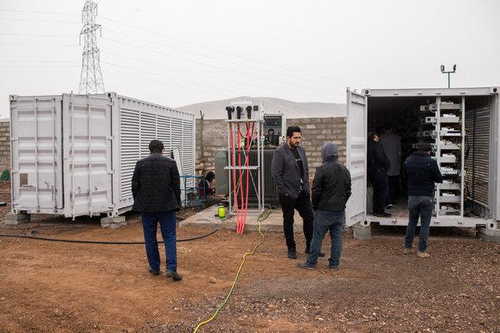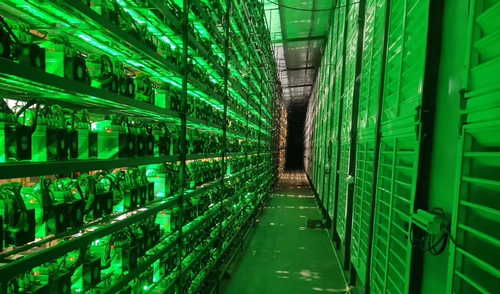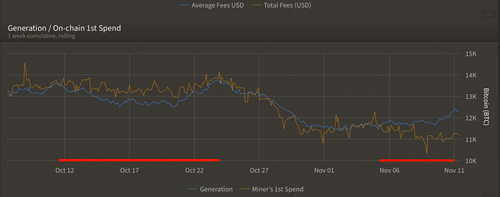There’s been a lot of reports over the last year detailing how mining operations have migrated to Iran for cheap electricity. After the initial migration, the Iranian government and the country’s power supplier noticed a lot of energy was being used by crypto mining facilities.
Following a government announcement about illegal miners, pictures were shared online that showed bitcoin miners housed inside a mosque.
Throughout the course of 2019, Iran’s government and the country’s energy officials have been creating new guidelines for bitcoin miners setting up data facilities in the oil-rich nation. On Wednesday, Mostafa Rajabi, a spokesperson for Iran’s Energy Ministry, described a new price model for mining operations and prices per kilowatt-hour (kWh) will fluctuate during certain months.
Iran’s Energy Ministry Plans to Pay Anyone Who Exposes Illegal Bitcoin Mining Operations
Spokesperson for Tavanir (Iranian power grid) Mostafa Rajabi.

On November 13, Iran’s Energy Ministry spokesperson Mostafa Rajabi explained the country’s new guidelines for mining operations during an interview with IRIB News. Rajabi told the press that anyone who identifies illegal bitcoin operations to the government will be rewarded. Rajabi emphasized that people who expose these facilities will be paid 20% of the recovery damage stolen from the electrical grid.
Fluctuating Electrical Prices
Iran’s Energy Ministry will also prohibit mining digital assets after the peak hours of consumption surpass a threshold of 300 hours annually. During the interview, Rajabi also noted how much bitcoin miners would be charged using the average price for the export of electricity in Iran. During some points of the year, miners could be charged $0.08 per kWh (9,650 rials) and during the cold months of the year, miners would only be charged $0.04 per kWh. However, during the summer months when electricity is used the most in Iran, electrical prices could quadruple to $0.16 per kWh, Rajabi noted. Rajabi disclosed that the new mining rules were initiated when Iran’s summer electrical demand jumped by 7%.

A Bitcoin mining facility in the desert outside of Tehran.
Last June, Iranian law enforcement officials reportedly confiscated 1,000 bitcoin miners from two facilities. This was followed by a bill that was ratified two months later stating that cryptocurrency mining in Iran would be considered a legitimate business. During Rajabi’s interview, he told IRIB News that Iran will help operations that create their own power plants with government incentives. Mining operations that utilize renewable energy sources would be also rewarded, Rajabi stressed.
Iranian Crypto Miners Tax Exempt If They Repatriate Offshore Earnings
Cryptocurrency miners in Iran will be eligible for a tax exemption if they agree to repatriate their overseas earnings, according to Iran’s National Tax Administration (INTA).
Per a report by local English-lanuage news daily Financial Tribune, INTA introduced a repatriation tax exemption similar to the one it offers non-oil exporters.
INTA considers cryptocurrency mining a taxable business, like any other industrial activity, and as such, believes it should follow the requirements set by the Central Bank of Iran in repatriating their overseas earnings.
Per the Financial Tribune, Iranian miners think that the government’s concerns over the possibility of capital flight is disproportionate. They reportedly claim that 70–80% of the revenue from their activities goes back into the production cycle.
Cheap electricity in Iran
Cryptocurrency mining has become a lucrative business in Iran in recent years due to extremely low electricity prices. Each kilowatt-hour costs only $0.05 cents, while one kilowatt-hour in the United States cost an average of $0.12, and in some states $0.33.
Electricity prices for crypto miners however, will now be set based on average power export rate in rials.
Iranian government authorizes crypto mining as industrial activity
As Cointelegraph previously reported at the end of July, the Iranian government, after months of speculation over the fate of mining cryptocurrencies in Iran, recognized crypto mining as legal industrial activity. However, just days later, the Iranian government instituted a new bill that does not accept crypto as legal tender or recognize domestic transactions carried out with cryptocurrencies.


